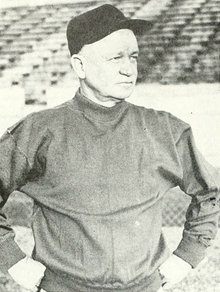William Alexander (coach)

Alexander from The 1944 Blue Print
|
|
| Sport(s) | Football, basketball |
|---|---|
| Biographical details | |
| Born |
June 6, 1889 Mud River, Kentucky |
| Died | April 23, 1950 (aged 60) Atlanta, Georgia |
| Playing career | |
| 1911–1912 | Georgia Tech |
| Position(s) | End,quarterback |
| Coaching career (HC unless noted) | |
| Football | |
| 1920–1944 | Georgia Tech |
| Basketball | |
| 1919–1924 | Georgia Tech |
| Administrative career (AD unless noted) | |
| 1920–1950 | Georgia Tech |
| Head coaching record | |
| Overall | 134–95–15 (football) 36–38 (basketball) |
| Bowls | 3–2 |
| Accomplishments and honors | |
| Championships | |
| Football 1 National (1928) 2 SIAA (1920–1921) 3 SoCon (1922, 1927–1928) 3 SEC (1939, 1943–1944) |
|
| Awards | |
| Football AFCA Coach of the Year (1942) Amos Alonzo Stagg Award (1947) SEC Coach of the Year (1939) |
|
|
College Football Hall of Fame Inducted in 1951 (profile) |
|
William Anderson Alexander (June 6, 1889 – April 23, 1950) was an American football player and coach. He served as the head football coach at the Georgia Institute of Technology from 1920 to 1944, compiling a record of 134–95–15. Alexander has the second most victories of any Tech football coach. Alexander's 1928 Georgia Tech Yellow Jackets have been recognized as national champions by a number of selectors. Alexander was the first college football coach to place his teams in the four major post-season bowl games of the time: Sugar, Cotton, Orange and Rose. His teams won three of the four bowls. The 1929 Rose Bowl win, which earned his team the national championship, is the most celebrated because of the wrong-way run by California's Roy Riegels. Alexander was also the head basketball coach at Georgia Tech for four seasons from 1919 to 1924. He was inducted into the College Football Hall of Fame as a coach in 1951.
Alexander played football under John Heisman and was appointed captain of the "scrubs." In his senior year he played in the Georgia and Clemson games long enough to win a letter. Alexander graduated from Georgia Tech in 1912 with a degree in civil engineering. Valedictorian of his class, he was also a brother of the Kappa Sigma fraternity.
"Old Aleck," as Alexander was called, succeeded John Heisman as the head coach at Georgia Tech in April 1920. Alexander had been an assistant coach for Heisman and a math teacher in the classroom at Georgia Tech. The Technique said of him:
...
Wikipedia
